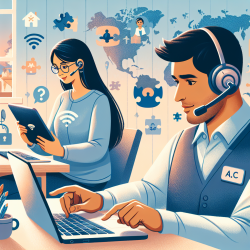As we navigate the ever-evolving landscape of education and mental health, the emergence of online therapy as a viable and effective means of support for students in special education cannot be overlooked. The concept of virtual therapy, once a novel idea, has rapidly become a cornerstone in the field of special education, offering a new horizon of possibilities for educational psychologists and the students they serve. The aim of this exploration is to delve into how online therapy is reshaping the approach to special education, fostering an environment where every student has the opportunity to achieve self-actualization.
In the realm of special education, the unique challenges faced by students require equally unique solutions. Traditional therapy models, while effective, often encounter barriers such as accessibility, stigma, and resource limitations. Online therapy, with its inherent flexibility and accessibility, emerges as a beacon of hope, addressing these challenges head-on and opening the door to a more inclusive and equitable form of support.
At its core, online therapy for special education is about more than just convenience. It's about creating a space where students feel safe, understood, and supported in their journey towards self-actualization. Educational psychologists play a pivotal role in this process, leveraging the power of virtual therapy to reach students in a way that transcends geographical and physical limitations. This innovative approach not only broadens the scope of who can be helped but also how help can be administered.
The benefits of online therapy in special education are manifold. Firstly, it significantly increases access to mental health services. Students in remote or underserved areas, who previously might have gone without the support they need, can now receive high-quality therapy sessions from the comfort of their own homes. This democratization of access is a game-changer, ensuring that every child, regardless of their location or socioeconomic status, has the opportunity to thrive.
Moreover, online therapy offers a level of flexibility that is unparalleled. Scheduling conflicts, a common barrier in traditional therapy settings, become less of an issue as sessions can be more easily tailored to fit the busy lives of students and their families. This adaptability not only makes therapy more accessible but also more sustainable in the long term, as students are less likely to miss sessions and more likely to stay engaged with the therapeutic process.
Another significant advantage is the comfort and familiarity that the online environment offers to students. For many, especially those with social anxieties or certain disabilities, the prospect of attending therapy in a traditional setting can be daunting. Online therapy, by contrast, allows them to engage in meaningful therapeutic work in a space where they feel most at ease. This can lead to greater openness, faster progress, and a more profound therapeutic impact.
From a practical standpoint, online therapy also allows for a more diversified approach to treatment. Educational psychologists can utilize a wide array of digital tools and resources to enhance the therapeutic experience. Interactive games, virtual reality environments, and multimedia resources can all be integrated into sessions to support the learning and development of students in engaging and innovative ways.
However, the transition to online therapy is not without its challenges. Concerns regarding the digital divide, privacy, and the efficacy of virtual interventions compared to in-person sessions are valid and require careful consideration. Educational psychologists venturing into the realm of online therapy must be adept at navigating these challenges, ensuring that the services they provide are not only effective but also equitable and secure.
Addressing these concerns starts with a commitment to ongoing education and training in the best practices for online therapy. It also involves advocating for policies and infrastructure that support equitable access to technology and high-speed internet for all students. Moreover, establishing clear guidelines and protocols for privacy and confidentiality in the virtual space is paramount to maintaining the trust and safety of students and their families.
In the journey towards self-actualization for students in special education, online therapy represents a significant leap forward. It embodies a shift towards a more inclusive, accessible, and flexible model of support that acknowledges and addresses the unique needs of every student. As educational psychologists, embracing virtual therapy means not only adapting to the changes in our field but also leading the charge in creating a future where every student has the tools and support they need to reach their full potential.
In conclusion, the rise of online therapy in special education is more than just a trend; it's a transformative movement towards a more empathetic, accessible, and effective model of care. By leveraging the power of technology, educational psychologists can transcend traditional barriers, opening up a world of possibilities for students striving towards self-actualization. As we continue to explore and expand the boundaries of what is possible in virtual therapy, we are not just witnessing the evolution of special education; we are actively participating in it, shaping a future where every student can thrive.










